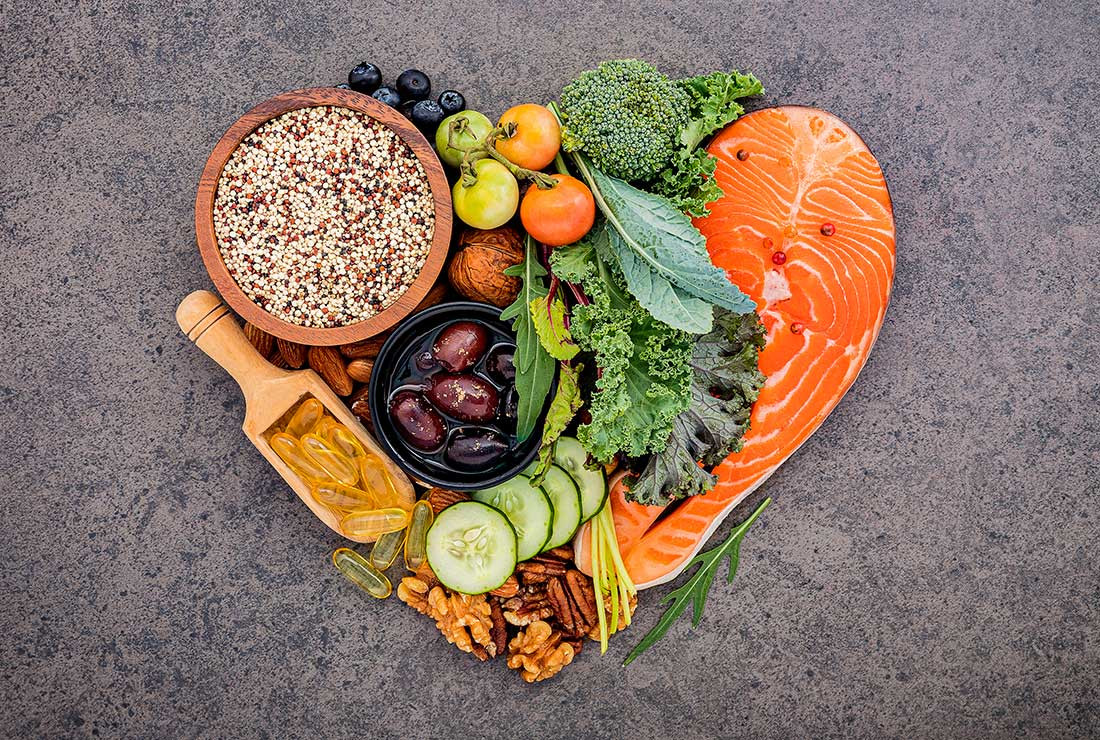Best Brands for Gluten Free BBQ Sauce in Chicago
Best Brands for Gluten Free BBQ Sauce in Chicago
Blog Article
All Regarding Healthy And Balanced Food: Benefits of Embracing Plant Based Options
The discussion bordering plant-based diet regimens has actually obtained considerable attention recently. Many people are checking out the possible health benefits, nutritional advantages, and environmental impacts connected with these dietary choices. As people end up being extra conscious of their food's influence on wellness and sustainability, concerns emerge regarding the functionalities of embracing such a way of life. What specific changes can one anticipate, and just how might these options reshape not just personal wellness yet likewise the planet's future?
Recognizing Plant-Based Diet Plans
Lots of individuals connect plant-based diet regimens generally with vegetarianism or veganism, these diet regimens can include a large range of eating patterns that focus on entire, minimally refined plant foods. Such diet plans frequently consist of fruits, veggies, entire grains, nuts, beans, and seeds, while restricting or getting rid of pet items. This versatility permits individuals to tailor their dietary choices according to personal preferences and dietary requirements. Some may adopt a mostly plant-based diet while still occasionally consuming meat or milk, frequently described as a flexitarian strategy. The focus remains on including more plant foods, which can cause a varied selection of meals and flavors. Comprehending these numerous analyses of plant-based consuming is necessary for valuing its availability and charm in contemporary food culture.
Wellness Benefits of Plant-Based Foods
The health and wellness benefits of plant-based foods are considerable, offering a nutrient thickness benefit that sustains general health. Research study shows that these foods can enhance heart health and play a vital role in reliable weight administration. By including extra plant-based choices, individuals might enhance their dietary options and promote long-term health.
Nutrient Thickness Benefit
Nutrient thickness plays an important function in the health and wellness advantages of plant-based foods, making them an engaging choice for those looking for a well balanced diet plan. Plant-based foods, such as fruits, veggies, beans, nuts, and whole grains, are typically abundant in crucial vitamins, minerals, and antioxidants while being lower in calories. This high nutrient thickness permits individuals to consume fewer calories while still meeting their dietary needs. Additionally, these foods are packed with nutritional fiber, advertising digestion health and wellness and assisting in weight monitoring. By integrating nutrient-dense plant-based options, customers can boost their total health, sustain their immune systems, and decrease the danger of persistent diseases. Eventually, the nutrient thickness of plant-based foods underscores their value in a health-conscious lifestyle.
Heart Health And Wellness Improvement

Weight Management Support
In enhancement to advertising heart health and wellness, a plant-based diet regimen can significantly assist in weight administration. This dietary approach stresses entire foods such as fruits, veggies, beans, nuts, and entire grains, which are generally lower in calories and greater in fiber compared to animal-based products. The high fiber content helps raise satiety, decreasing overall calorie intake. In addition, plant-based diet regimens are frequently rich in necessary nutrients while reduced in harmful fats, making it much easier to keep a healthy weight. Gluten Free BBQ Sauce. Research suggests that individuals who adopt a plant-based way of living tend to have lower body mass indexes (BMIs) and experience more effective weight reduction contrasted to those who take in meat-heavy diet plans. Consequently, embracing plant-based choices is a strategic selection for reliable weight monitoring
Nutritional Worth of Plant-Based Ingredients
Plant-based ingredients are abundant in necessary nutrients, providing a varied array of vitamins, minerals, and anti-oxidants that add to overall wellness. A contrast of healthy protein sources discloses that while pet items are often considered as exceptional, many plant-based options offer adequate protein and various other advantageous substances. Understanding the nutritional worth of these components can aid individuals make educated dietary selections.
Necessary Nutrients in Plants
Nutrient-rich ingredients located in plants use a varied variety of essential nutrients that contribute considerably to overall wellness. These ingredients are abundant in vitamins A, C, and K, which support immune feature, vision, and blood clotting, respectively. Additionally, plants give vital minerals such as magnesium, potassium, and calcium, crucial for heart wellness, muscle mass function, and bone strength. The visibility of fiber in plant-based foods help food digestion and promotes a healthy and balanced digestive tract microbiome. Antioxidants, located perfectly in vegetables and fruits, help fight oxidative site web anxiety and lower inflammation. In addition, many plant foods are low in calories yet high in nutrients, making them an exceptional option for those looking for to maintain a healthy weight while ensuring perfect nutrient consumption.
Comparing Healthy Protein Sources
Healthy protein resources vary substantially in their dietary accounts, with plant-based components providing special advantages. Unlike animal healthy proteins, which frequently have hydrogenated fats and cholesterol, plant proteins have a tendency to be lower in these harmful parts. Legumes, nuts, seeds, and entire grains are abundant in essential amino acids, fiber, vitamins, and minerals. For example, lentils offer high healthy protein material together with substantial iron and folate, while quinoa is a complete healthy protein, offering all nine important amino acids. Additionally, plant-based proteins are frequently come with by antioxidants and phytochemicals that sustain general wellness. The change to plant-based protein sources not just improves nutritional intake but likewise aligns with sustainable dietary methods, decreasing ecological influence and advertising long-term wellness advantages.
Ecological Impact of Plant-Based Eating
As recognition of environment change grows, numerous individuals are checking out sustainable nutritional choices that can greatly lessen their ecological footprint. pop over here Plant-based consuming has become a substantial factor to decreasing greenhouse gas exhausts, which are largely related to livestock manufacturing. The growing of fruits, grains, beans, and veggies usually calls for less resources, such as water and land, compared to pet farming. In addition, plant-based diets can result in reduced logging, as much less land is needed for grazing livestock or growing animal feed. By changing in the direction of plant-based options, consumers can support biodiversity and promote healthier ecological communities. Overall, accepting plant-based eating not just advantages individual wellness yet additionally represents a vital step toward environmental sustainability and conservation efforts.
Overcoming Common Misconceptions
While lots of people acknowledge the advantages of a plant-based diet plan, a number of mistaken beliefs usually deter them from fully embracing this lifestyle. A common idea is that plant-based diet regimens do not have enough healthy protein; nevertheless, many plant sources, such as vegetables, nuts, and tofu, give enough healthy protein. In addition, some think that this diet regimen is costly, when actually, staples like beans, rice, and seasonal vegetables can be quite cost effective. One more false impression is that plant-based consuming is excessively restrictive, whereas it in fact supplies a varied range of tastes and foods. Many stress that a plant-based diet plan may lead to shortages, yet with appropriate planning, people can obtain all essential nutrients, including minerals and vitamins, while taking pleasure in a broad selection of tasty dishes. Broad Tips for Transitioning to a Plant-Based Lifestyle
Making the shift to a plant-based lifestyle can be an enhancing experience, though it frequently calls for some assistance to browse the initial adjustments. People are encouraged to begin progressively, integrating even more fruits, veggies, legumes, and whole grains right into their dishes while reducing meat and milk consumption. Dish preparation is vital; preparing an once a week menu can assist reduce the modification and protect against last-minute undesirable options. Discovering cooking approaches and brand-new recipes can also keep and boost the experience excitement about plant-based eating. Furthermore, signing up with support system or communities can offer motivation and share useful ideas. Ultimately, remaining educated about nutrition guarantees balanced meals, avoiding deficiencies while promoting a healthy, gratifying plant-based way of life.
Delicious Plant-Based Dish Ideas
Discovering delicious plant-based dish concepts can inspire people to embrace an extra nourishing diet. One preferred option is a hearty quinoa salad, including cherry tomatoes, cucumber, and a zesty lemon-tahini clothing. An additional favorite is a mouthwatering lentil stew, loaded with carrots, celery, and fragrant natural herbs, ideal for a comforting dinner. For morning meal, over night oats made with almond milk, chia seeds, and topped with fresh berries offer a nourishing start to the day. Additionally, a lively veggie stir-fry with tofu and a variety of vibrant veggies can be a fast yet pleasing dish. Finally, creamy avocado toast on whole-grain bread, sprayed with seeds and seasonings, provides a basic yet savory snack. These meals display the range and splendor of plant-based consuming.

Often Asked Concerns
Can a Plant-Based Diet Provide Sufficient Protein?
The question of whether a plant-based diet regimen can supply sufficient healthy protein prevails. Various sources, consisting of vegetables, nuts, seeds, and entire grains, can satisfy protein requires successfully, supporting a nutritious and well balanced diet for people.
Are Plant-Based Diet Plans Suitable for Children?
The viability of plant-based diet plans for children relies on careful preparation. Sufficient nutrients must be ensured, including minerals, proteins, and vitamins. With proper advice, such diet plans can sustain healthy development and development in kids.
How Do I Eat Out on a Plant-Based Diet?
Eating in restaurants on a plant-based diet plan involves seeking dining establishments with diverse food selections, asking for adjustments, and exploring vegan-friendly choices. Preparation ahead and interacting nutritional choices can enhance the dining experience while keeping dietary options.
What Are Usual Irritants in Plant-Based Foods?
Common irritants in plant-based foods consist of soy, gluten, nuts, and seeds - BBQ Sauces. Individuals complying with a plant-based diet plan needs to recognize these allergens and check out tags meticulously to avoid unfavorable responses and assure secure consumption
Can Plant-Based Diets Assist With Weight Loss?
Research indicates that embracing a plant-based diet plan might promote weight loss due to its usually reduced calorie thickness and greater fiber material. This mix can improve satiation, assisting people handle their calorie consumption effectively. Numerous people associate plant-based diet plans primarily with vegetarianism or veganism, these diet plans can encompass a broad range this website of eating patterns that prioritize entire, minimally refined plant foods. Nutrient density plays a crucial duty in the wellness advantages of plant-based foods, making them an engaging option for those seeking a balanced diet. Plant-based diet regimens have actually been revealed to substantially boost heart health and wellness, as they typically consist of aspects that support cardiovascular feature. In enhancement to promoting heart health, a plant-based diet regimen can substantially help in weight administration. A common idea is that plant-based diet plans lack sufficient healthy protein; nevertheless, various plant resources, such as vegetables, nuts, and tofu, offer ample healthy protein.
Report this page